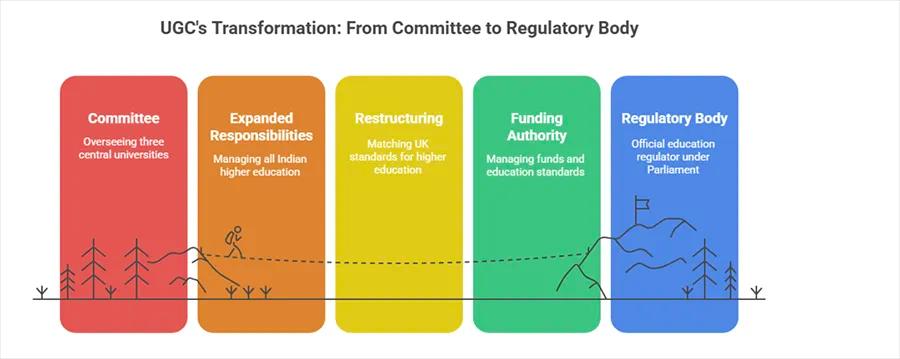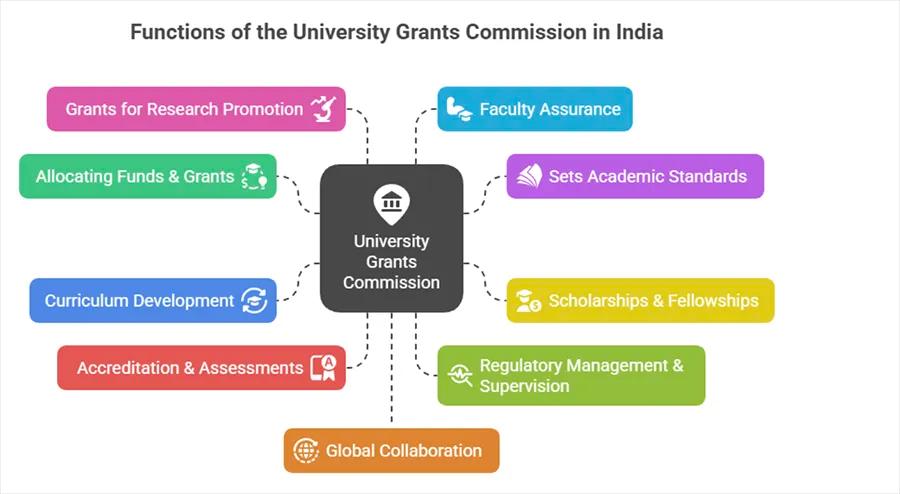You might have seen these headlines popping up on your phone every year. People often go through the list of universities, but very few people verify them. Why? Because it is coming from a reliable source, known as UGC. In a country where thousands of higher education institutes are functioning, ensuring the quality of education standards is crucial.
UGC is the primary regulatory body that regulates the education system in India. With this blog, we shall discuss the UGC full form, its roles, and functioning across the nation. Discover that nobody talks about where UGC came from. So, are you ready to explore the features of UGC? Let us dive into understanding why UGC holds such importance in the education realm.
The full form of UGC is “University Grants Commission”. The commission is an initiative of the Indian Government in connection with the UGC Act 1956. It was established under the Ministry of Human Resources & Development, now known as the Ministry of Education. The role of UGC is limited to the education sector across the nation. The commission is assigned to maintain the highest standards of education in India. It acknowledges the colleges and universities functioning all over the nation and disburses funding. Moreover, the UGC’s head office is located in New Delhi. It has regional offices established across India.

| Parameters | Details |
|---|
| UGC Full Form | University Grants Commission |
| Established In | 1953 (official), UGC Act passed in 1956 |
| First UGC Accredited Universities | Delhi, Banaras (Varanasi), Aligarh |
| Headquarters | New Delhi, India |
| Authority | Ministry of Education, Government of India |
| Current Chairman | M. Jagadesh Kumar (2025) |
| Motto | Gyan-Vigyan Vimuktaye (Knowledge Liberates) |
You May Also Read:
UGC Since 1953: Understanding History in Brief
University Grants Commission or UGC’s history dates back to 1945, pre-independence. Back then, it was established as a committee and known as the University Education Commission in 1948. Let us quickly understand the history step by step:
-
📊
In 1945, UGC was established as a committee to oversee the functioning of three central universities of Delhi, Varanasi, & Aligarh.
-
📊
In 1947, the responsibilities of the committee (UGC) were expanded to all universities in India, enhancing UGC’s role to manage all Indian higher education institutes.
-
📊
From 1948-49, the University Education Commission (UEC) was established under the chairmanship of Dr. Sarvapalli Radhakrishnan to restructure the committee following UK standards.
-
📊
1952: The government gave UGC authority to manage the funds and education standards of universities and HEIs across India.
-
📊
In 1953, the University Grants Commission was officially launched by Maulana Abdul Kalam Azad on December 28, 1953.
-
📊
1956: UGC was granted statutory status with the passing of the University Grants Commission Act 1956, making it the official regulatory body for education under Parliament.
Roles of the University Grants Commission in India
The University Grants Commission is in charge of various roles regarding maintaining the standards of quality education in India. Here are some of the most crucial roles of UGC. Take a look:
-
🎓
Grants & Funding: UGC offers financial assistance to universities and higher education institutes in India, including research, faculty, and other development areas.
-
🎓
Fosters Research: UGC promotes engagement in research and innovation-based projects, provides grants, supports amenities, and encourages immersive learning.
-
🎓
Quality Assurance: UGC formulates guidelines for faculty qualifications, instructional standards, and infrastructure, and conducts inspections to ensure compliance.
-
🎓
Curriculum Designing: UGC plays a vital role in syllabus development, issuing updates and guidelines to maintain an up-to-date curriculum across disciplines.
-
🎓
Serves as a Regulatory Body: UGC ensures colleges and universities adhere to educational policies, grants recognition, supervises functioning, and intervenes when standards are low.
-
🎓
Scholarship & Fellowship Programmes: UGC provides scholarships and fellowships to assist economically disadvantaged students in UGC-approved institutions.
Functions of the University Grants Commission in India
The University Grants Commission manages the various educational aspects of the universities in India. It has various responsibilities and functions to perform and conduct across the nation. Here are the top ones:

-
📋
Allocating the Funds & Grants: UGC allots funds to higher education institutes based on proposals and needs to support educational modernisation, evolution, and expansion.
-
📋
Sets Academic Standards for HEIs: UGC provides mandatory guidelines covering course content, faculty qualifications, and infrastructure development to ensure quality education.
-
📋
Scholarships & Fellowships: UGC offers scholarship and fellowship programmes like JRF and NET to support students financially in higher education.
-
📋
Curriculum Development: UGC revises and upgrades syllabi to maintain relevance with industry demands and global education standards.
-
📋
Accreditation & Assessments: UGC performs assessments to ensure institutions comply with its guidelines and grants UGC-approved status accordingly.
-
📋
Regulatory Management & Supervision: UGC oversees universities and intervenes in cases of mismanagement or violation of educational norms.
-
📋
Grants for Research Promotion: UGC provides support and funding for research projects, seminars, and conferences to enhance learning experiences.
-
📋
Faculty Assurance: UGC offers programmes to ensure faculty development and quality teaching standards are maintained.
-
📋
Global Collaboration: UGC fosters partnerships with foreign universities, encouraging joint research, exchange programmes, and global academic excellence.
Logging Out
The University Grants Commission was established to ensure that the Indian education system meets global academic standards. Initially founded to supervise the functioning of three universities, UGC now manages all the higher education institutes in India apart from IITs and IIMs, as they directly function under the Ministry of Education. UGC grants funds and recognition to those universities and colleges, which are meeting the education norms and UGC guidelines. It ensures that the education provided to students must come from qualified mentors, recognised institutions, and maintain relevance to current industry demands. So, whether you are a fresher or a graduate, make sure your institution is approved by UGC and adheres to the guidelines mentioned above.
FAQ’s
Q.1. What are the roles and functions of UGC?
UGC ensures that higher education institutes in India meet the standard educational norms. It includes faculty, curriculum, examination, and infrastructure development. The authority provides funds and grants to the universities to maintain education standards in the above-listed fields.
Q.2. What are the benefits of UGC approved universities?
A UGC approved institution is recognised by the government of India and holds legal value globally. A UGC approved degree is mandatory to apply for various government jobs. Companies in the private sector also recognise UGC approved degrees.
Q.3. Who is the head of UGC?
Currently, the head of UGC is Vineet Joshi. He is also appointed as the Secretary of the Department of Higher Education.
Q.4. What is the motto of UGC?
University Grants Commission’s motto is Gyan-Vigyan Vimuktaye. It refers to the meaning that “knowledge liberates”.
Q.5. Who is the first chairman of UGC?
Dr. Shanti Swaroop Bhatnagar is known to be the first chairman of the University Grants Commission. He served in the role from 1953 to 1955.
Every query is necessary.
Our team of experts, or experienced individuals, will answer it over online meet. Book your slot now!
Book Free Online Counselling
Isha Education Counsellor / Editor

Isha Jain holds a Bachelor's degree in Literature along with a Diploma in Digital Marketing, bringing a strong foundation in communication and content creation. With over 7 years of hands-on experience in the education domain, she has crafted impactful content across various formats - ranging from educational blogs and news articles to video scripts, newsletters, and learner-focused campaigns.
As the editorial lead at Learning Routes, Isha plays a key role in shaping content that empowers students and working professionals to make confident choices about online courses and career-building certifications. Her deep understanding of the online education space is reflected in her writing, which aims to simplify complex decisions and provide real-world clarity to learners.
Beyond her professional role, Isha has also written extensively on lifestyle and digital learning trends. She is passionate about guiding students and loves engaging in conversations around career development on platforms like LinkedIn, Quora, and Reddit. Whether it's recommending the right upskilling path or demystifying online education, she has helped countless learners take confident steps toward their goals.
In her spare time, you’ll find Isha reading, traveling, or playing sports to stay active and inspired.
Read more


